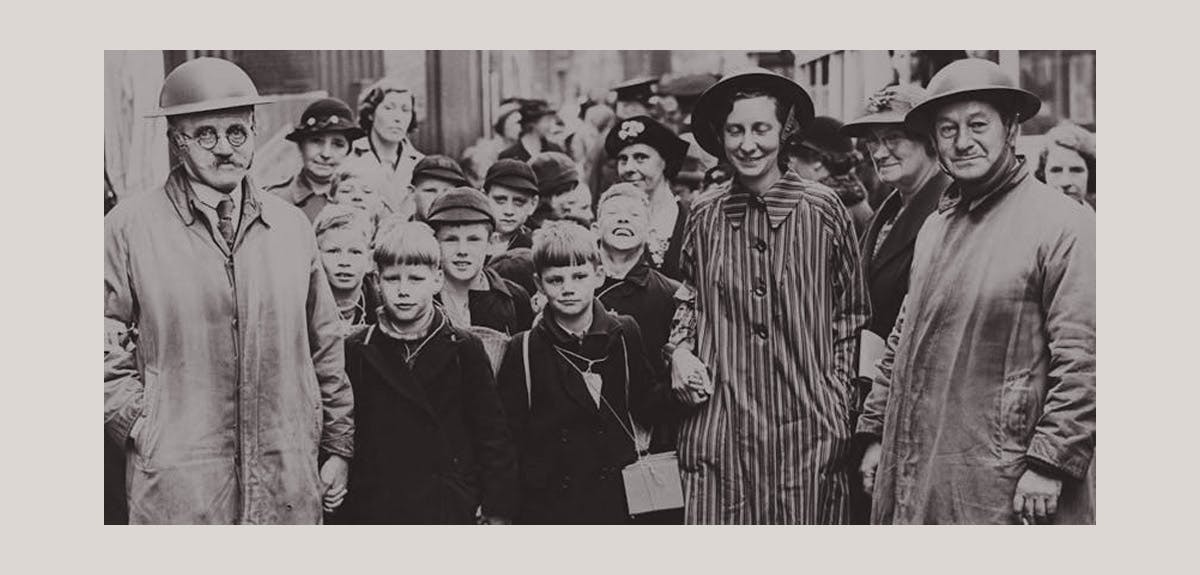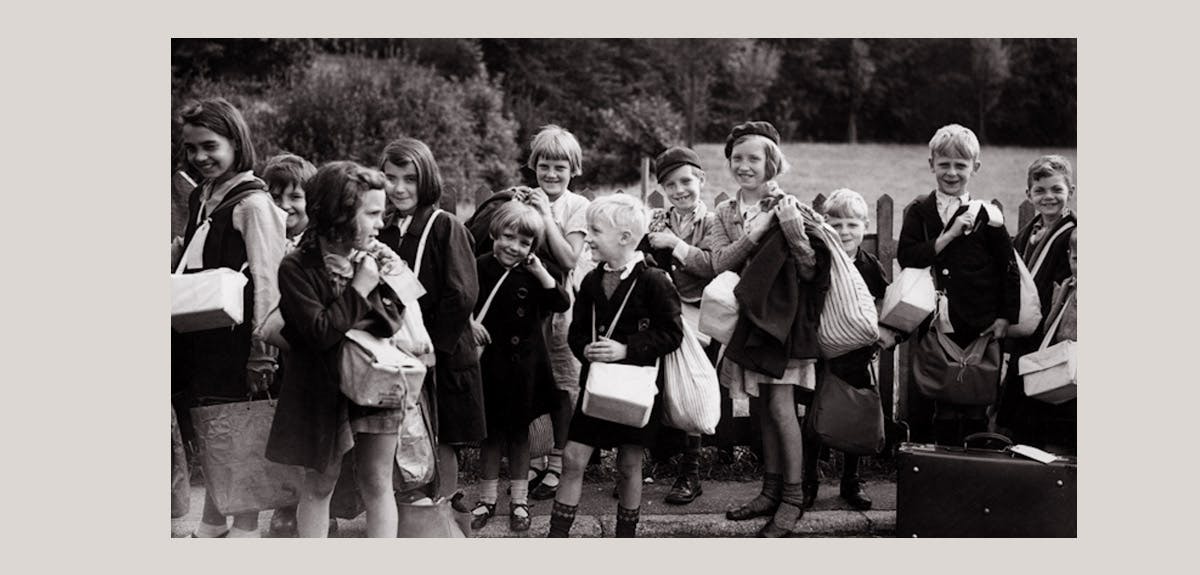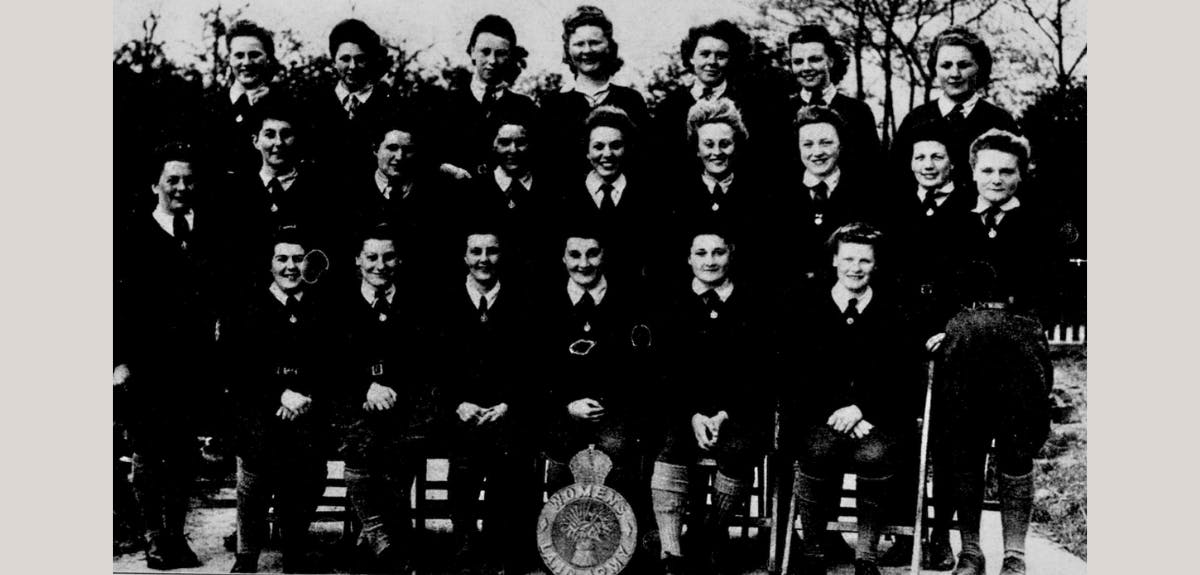Understanding the vital role of the Special Constabulary in wartime Britain
6-7 minute read
By Niall Cullen | March 24, 2025
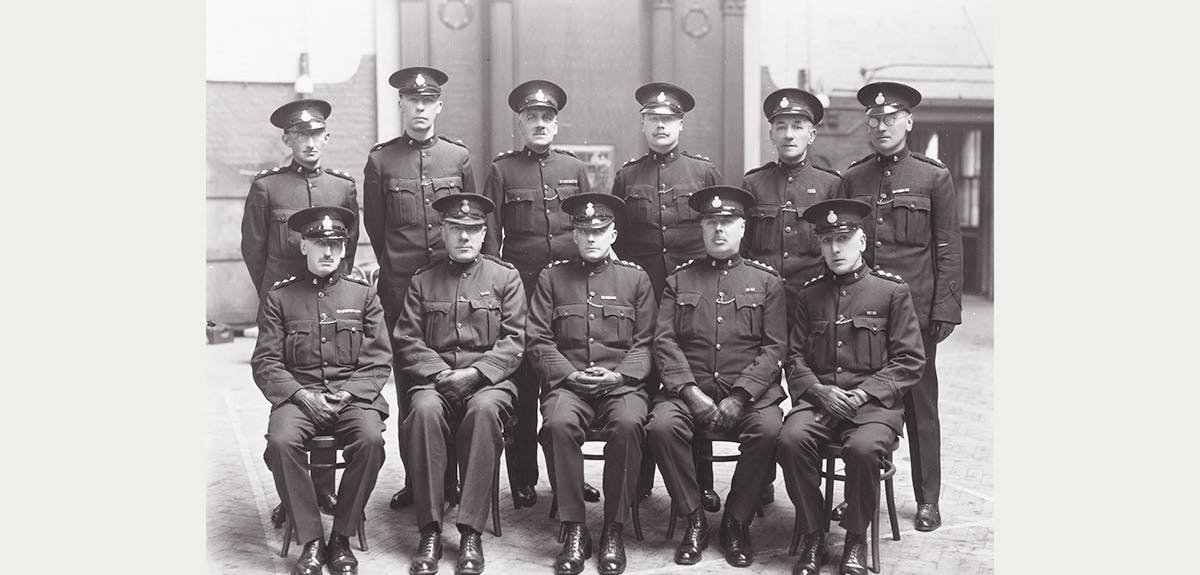
There are over 100,000 special constables recorded in the 1939 Register. Explore the crucial part they played on Britain's path to victory.
Background warriors on the home front. Thousands of men and women volunteered to keep Britain's home fires burning as part of the Special Constabulary during World War 2. With their distinctive uniforms and steadfast dedication, they became the backbone of civilian safety during wartime. But what exactly did special constables do, and why have their stories been overshadowed by the more celebrated tales of bravery?
Find your family, home and town in the 1939 Register
Delve deeper into life on the home front in wartime Britain
As bombs rained down on cities and towns, Britain faced unprecedented challenges in maintaining law and order. Special constables emerged as pivotal figures in ensuring public safety and stability. Their presence was more than just a symbol, it was a lifeline for communities grappling with the chaos of war.
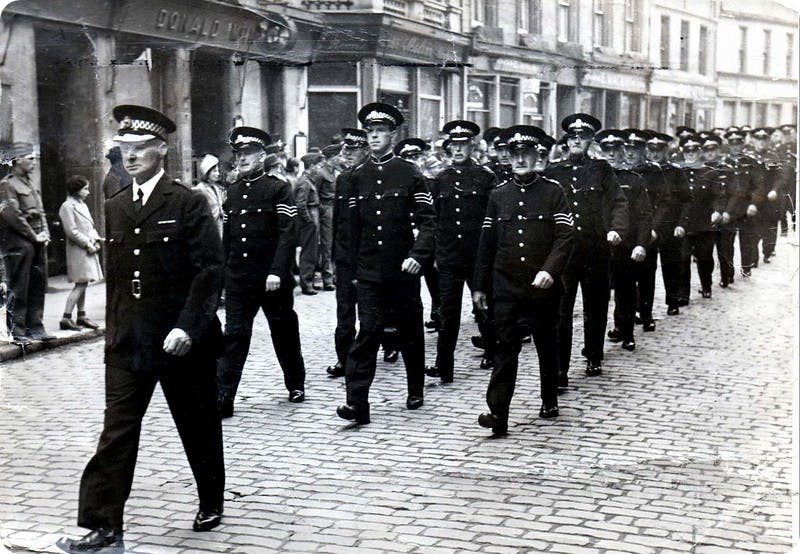
Special constables in Inverness during World War 2. Dave Conner/Flickr
Special constables were tasked with supporting the regular police force during this turbulent time. They provided essential assistance during air raids, guiding civilians to safety and ensuring that emergency services could operate effectively. Their efforts were crucial in maintaining calm when the world seemed to be falling apart. Without their vigilance and dedication, the burden on the regular police would have been overwhelming.
How were special constables different from regular police?
Special constables were volunteers who served part-time and were not full-time professional police officers. They were recruited to assist the regular police force during the wartime emergency and mainly performed duties in their local communities.
In many localities, special constables became the familiar faces of authority. They provided a sense of security and stability, acting as a vital link between the military and civilian populations. Their commitment ensured that even in the darkest hours, there was a semblance of order. These officers weren't just patrolling streets; they were the glue holding society together.
The government's reliance on special constables was a testament to their importance. With regular policing resources stretched thin, these volunteers filled the gaps, ensuring that law enforcement remained robust. They played a key role in the day-to-day operations that kept society functioning. A regular shift could see them directing traffic during blackouts or assisting in the aftermath of bombings.
Communities depended on these constabulary officers, not only for their policing duties but for the reassurance that someone was looking out for them. The Special Constabulary was more than just a temporary wartime measure; it was a critical component of the nation's resilience.
Special Constabulary recruitment and training
The onset of World War 2 saw a surge in special constable recruitment. Individuals from all walks of life stepped forward to don the officer's badge.
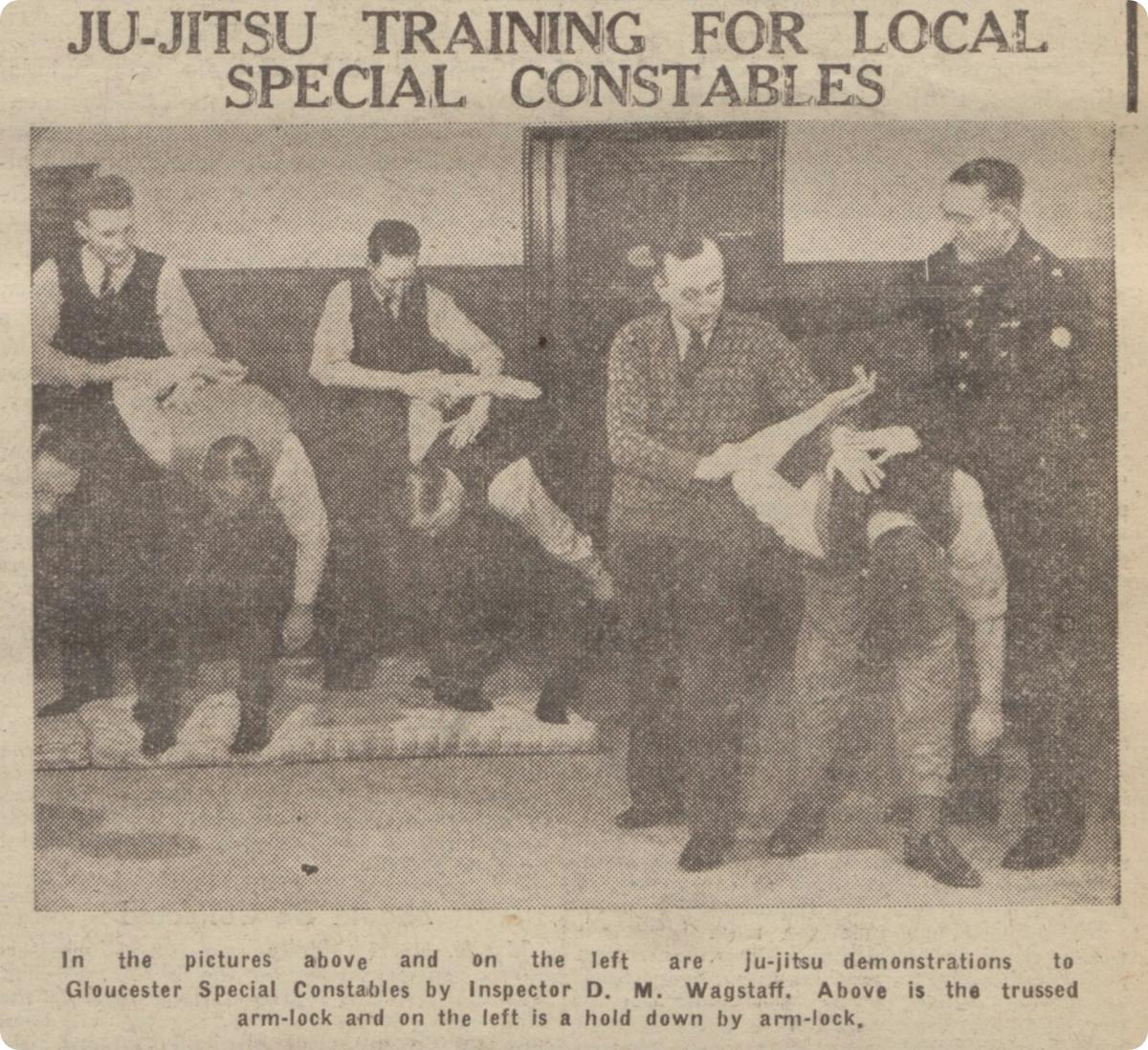
Special constables in Gloucester were trained in martial arts. Gloucester Journal, March 16, 1940. View the full newspaper article.
From seasoned war veterans to those with no prior experience, the Special Constabulary became a melting pot of backgrounds united by a common purpose. This diversity was one of its strengths, bringing together a wealth of skills and perspectives to tackle the challenges of wartime policing.
Training was a crucial element in preparing these volunteers for their new roles. The government prioritized swift and effective training programs, recognizing that these recruits needed to be ready for immediate service. Special constables received instruction on essential policing skills, from handling emergencies to maintaining order in the most trying circumstances.
The training equipped special constables with the knowledge and confidence required to perform their duties. They learned how to manage crowds, enforce regulations, and respond to a range of incidents, from minor disturbances to full-scale emergencies. This preparation was vital in ensuring that they could step into their roles with competence and authority.
The recruitment and training of special constables wasn't just about numbers. The aim was to build a force that could adapt to the rapidly changing demands of a nation at war. These volunteers became a crucial part of the police service, showcasing the power of community and the willingness to rise to the occasion.
Duties and responsibilities
Once on the beat, special constables took on a wide range of duties essential to the war effort. One of their most critical tasks was patrolling streets, especially during blackout conditions, to prevent looting and ensure public safety. As darkness enveloped cities, their presence was a deterrent to those who might exploit the chaos for criminal gain.
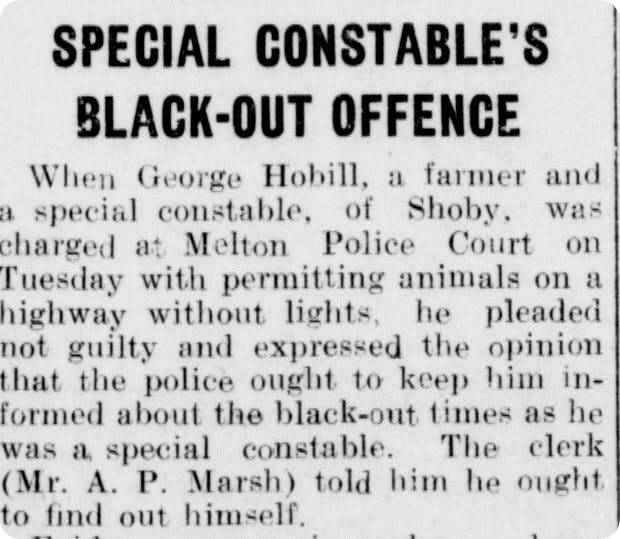
Special constables didn't always adhere to the rules they enforced. Melton Mowbray Times and Vale of Belvoir Gazette, January 3, 1941. View the full newspaper article.
Their responsibilities went far beyond patrolling. Special constables were instrumental during air raids, assisting with the evacuation of civilians to shelters and providing first aid to those in need. Their calm and composed demeanor helped maintain order, even as the skies erupted with the terror of bombing raids.
Ensuring air raid precautions were enforced was another vital role of the Special Constabulary. The officers were tasked with enforcing compliance, patrolling neighborhoods to monitor activity, and uphold the blackout regulations. Their vigilance was crucial in maintaining discipline and order at a time when the nation's nerves were frayed.
Special constables also coordinated with civil defense teams during bombing incidents. They worked closely with other emergency services to manage the aftermath, from assisting with evacuations to helping with rescue operations. Their ability to remain calm and composed under pressure was invaluable in these high-stakes situations.
In the aftermath of raids, special constables helped maintain calm and order. They assisted with clearing debris, supporting recovery efforts, and ensuring that communities could begin the process of rebuilding.
These determined volunteers also played a behind-the-scenes role in managing wartime rationing and resource distribution. They helped ensure that essential goods were fairly distributed, preventing hoarding and black market activities. Their efforts in this area were crucial to the nation's survival, ensuring that everyone had access to the necessities of life.
They also bore the responsibility of safeguarding vital infrastructure. From power plants to transport networks, they worked tirelessly to protect these strategic assets from sabotage and attack. Their presence provided an additional layer of security, helping to keep the country's critical services running smoothly.
Through their diverse duties, special constables became an indispensable part of the wartime fabric. They were the vigilant eyes and ears of the community, ensuring that even in the face of adversity, society continued to function and thrive.
Challenges faced by special constables
While their contribution was invaluable, special constables faced numerous challenges during the Second World War. The threat of enemy attacks was a constant shadow over their service. As they patrolled streets or manned checkpoints, they knew that danger was never far away. This ever-present risk required courage and a steely resolve, qualities that these officers possessed in abundance.
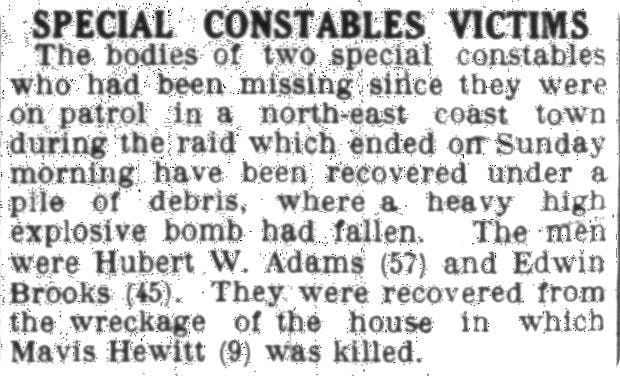
Many special constables paid the ultimate price for their efforts. Lincolnshire Echo, August 27, 1940. View the full newspaper article.
Limited resources and equipment posed significant hurdles for these volunteer officers. Unlike their regular counterparts, special constables often had to make do with whatever kit was available. This scarcity made their job even more challenging, requiring creativity and resourcefulness to fulfill their duties effectively.
Balancing their responsibilities as special constables with their civilian jobs and family life added another layer of complexity. Many of these volunteers held down full-time jobs, returning home from a long day only to don their uniforms and head out on patrol. The demands on their time and energy were immense, yet they rose to the occasion with remarkable dedication.
Harsh weather conditions and long hours further tested the endurance of special constables. Whether it was braving the cold winter nights or the sweltering summer heat, these officers remained steadfast in their commitment.
The psychological stress of constant danger and uncertainty took its toll on many special constables. The weight of responsibility, coupled with the ever-present risk of attack, required mental fortitude. Yet, despite these challenges, they carried out their duties with unwavering resolve, proving that their spirit was as unyielding as their courage.
Contribution to home front security
The presence of special constables was a powerful deterrent against criminal activities during wartime. Their vigilance and dedication helped maintain public order, ensuring that communities remained safe in the face of adversity. Collaborating with local authorities, they bolstered community security and reinforced the social fabric.
Special constables played a vital role in monitoring strategic locations to prevent espionage and sabotage. Their keen eyes and alert presence helped protect vital wartime industries and infrastructure, ensuring that these critical assets remained secure.
They actively engaged with communities to address concerns and enhance security. Their ability to connect with people on a personal level made them invaluable assets to their communities.
Recognition and awards
Special constables were commended for their bravery and dedication during the war with the Special Constable Medal. Some were recognized by their local communities or received letters of appreciation for their service.
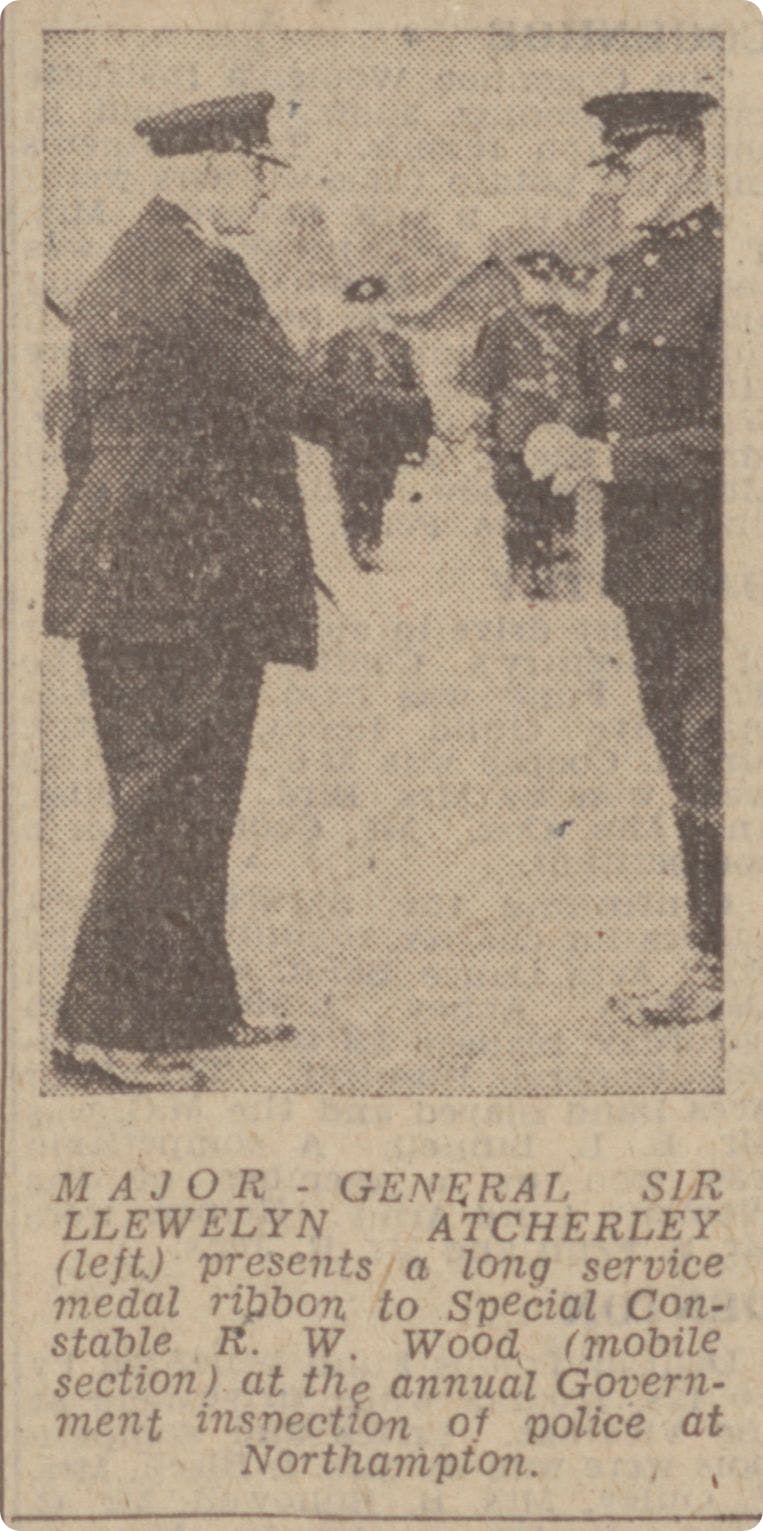
Special constables received medals for long service. Northampton Mercury, July 21, 1944. View the full newspaper article.
Many special constables received commendations for their outstanding service. These recognitions highlighted the critical role they played in national security. The respect and admiration they earned from their fellow citizens were well-deserved.
Public ceremonies were held to honor the contributions of special constables, showcasing the impact of their service on the nation's war effort. These events were more than just formalities; they were celebrations of courage and selflessness, reminding everyone of the sacrifices made by these unsung heroes.
These awards and honors served as reminders of the power of ordinary people to make a difference, even in the most challenging of circumstances.
The wartime service of special constables left a lasting impact on British police history and wider society. Their contributions during World War 2 paved the way for modern voluntary policing initiatives.
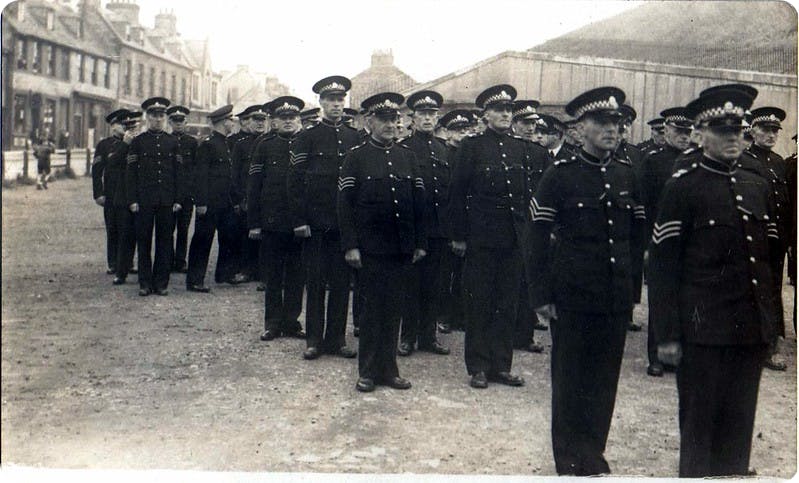
Wartime era special constables. Dave Conner/Flickr
The legacy of special constables continues to resonate today, inspiring future generations to serve their communities with dedication and courage. Their service during World War 2 exemplified the power of solidarity. It proved that even in the darkest times, there is strength to be found in community action.
Today, the Special Constabulary remains a vital part of the British policing landscape, a testament to the enduring legacy of those who served during World War 2.
We can honor the legacy of special constables' dedication during World War 2 by exploring and sharing their incredible stories. Their bravery and dedication should never be forgotten.

